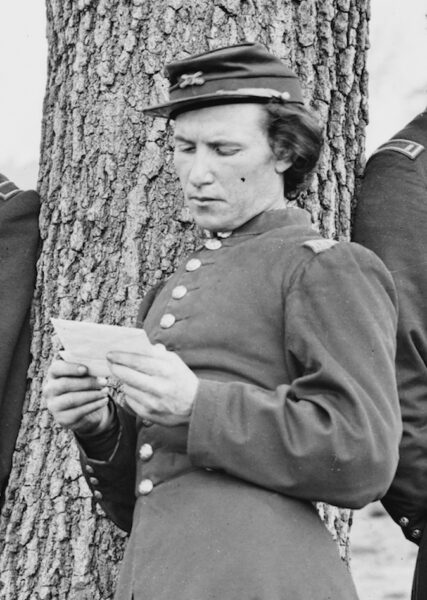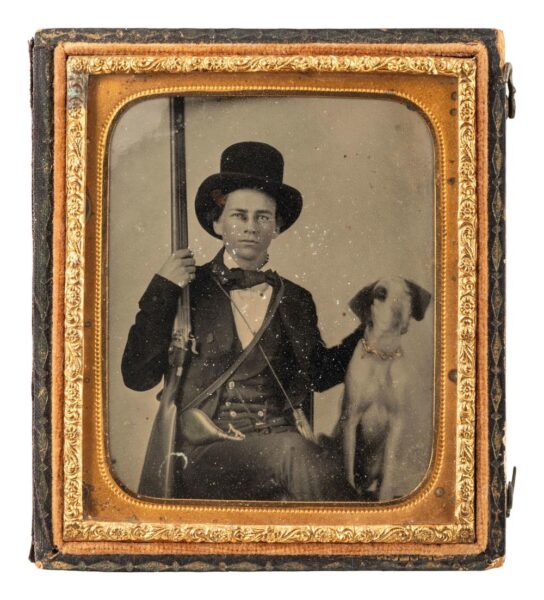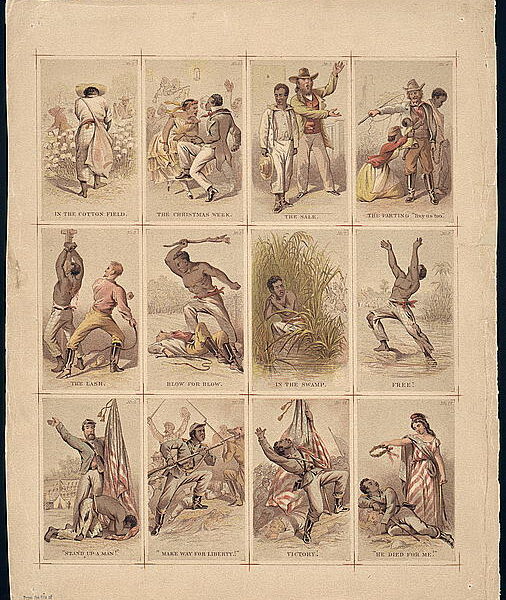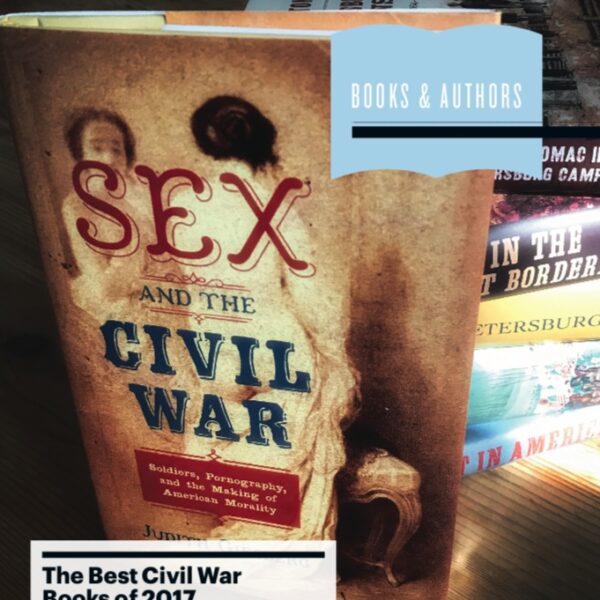 Library of Congress
Library of CongressA Union officer holds a letter from home in a wartime photograph.
In the Voices section of our Spring 2025 issue we highlighted quotes by Union and Confederate soldiers about their constant craving of news from friends and loved ones at home. Unfortunately, we didn’t have room to include all that we found. Below are those that just missed the cut.
“You cannot imagine how it cheers me—a letter even from one I never saw. It seems almost to say, ‘Fight on, Mac! There is something left in the gallant North that is worth defending—something worth defending. There are true hearts beating there yet; and warm souls that remember you!’ And it does make me bear hardships I once thought did not exist, with a light spirit.”
—W.M. McLain, 32nd Ohio Infantry, in an undated wartime letter written to an unknown recipient
“Letters from home again to-day. What a blessing it is to those who are far away, to receive letters from home and friends. How welcome are these white-winged messengers, as they come to us laden with friendship, reminding us of home with its many pleasant associations. Surely this is a great source of happiness.”
—John C. Williams, 14th Vermont Infantry, in his diary, January 7, 1863
“You would laugh to see the excitement when the mail arrives. It goes to the division headquarters, and is assorted for different regiments; then it is sent round to the adjutant of each regiment. The way we know of its arrival is, a man with a drum steps out before the adjutant’s tent and gives the call for the orderlies. This call is a short prelude or roll and four separate taps of the drum; and moderately the orderly of each company goes to the door and receives the mail for his company: he takes it to the tent of his company and calls out, ‘Boys, come out for your mail,’ and then comes a rush!”
—H.H. Penniman, a surgeon in the Union army’s XVII Corps, in a letter home in 1863
“Letters from home, full of love, hope, encouragement, confidence, and good advice do much, very much, towards keeping up the spirits of men in the army.
If such letters were oftener received, I am sure there would be fewer mothers to weep when they think of their wandering boys. The women of this country have done nobly for the material comfort of their soldiers, but I think they might be a little more prodigal of kind words. Oh, you don’t know what letters are to soldiers! I have seen men who never flinched in battle, or faltered when one comrade after another fell by their side, weep like children because the mail brought them no messages from home. I am sure if those who love them could see their disappointment they would write very often, and tell them every little thing about home and friends. And we like, too, to hear from those whom we have never seen, — the good, true women of our land, whom we respect and honor, and for whose welfare we fight, and are ready to lay down our arms….
If you can write to me and will do so, I should like much to receive a letter; if not, please write to some other soldier.”
—Letter, written in 1863, by an anonymous “western” Union soldier to “a New-England woman,” published by the United States Sanitary Commission in 1865
“I received your kind letter this evening, and it was like water to the thirsty soul.”
—An anonymous Union soldier, in an undated wartime letter to a “Dear Friend,” published in 1865 by the United States Sanitary Commission
“You in your pleasant homes, surrounded by the comforts of life, enjoying the society of friends and relatives, have but a faint idea of the joy a soldier experiences on receiving letters from the loved ones at home. Even if he knows they are all well, he is not satisfied unless he hears directly from their own hand.”
—Union soldier John Whipple, in a letter home, February 11, 1863
 Letters of William Wheeler of the Class of 1855, Y.C
Letters of William Wheeler of the Class of 1855, Y.CUnion officer William Wheeler
“I frequently feel like saying to my correspondents, ‘Be more frivolous, describe little things more carefully, and don’t touch upon great things—if you must, do so superficially and say no more than every one else and the newspapers say.’”
—New York artillerist William Wheeler, in a letter home, January 28, 1862
“And passing by many other things, I come to the letter, whose hopeful words of trust will be often called to mind in the future. It was written in Maine, but patriots know no sections. Maine is a part of my country, as Wisconsin is of yours. Virginian soldiers fought side by side with us from Illinois and Wisconsin, here at Vicksburg, and many of our best regiments are in the ‘Army of the Potomac.’ Let us be glad over the successes all along our far-extended battle-line, in the last few months. But we need not a whit less to look earnestly to Providence for direction that the coming peace may be more than a truce, to break out again in discord, after a little season, as it certainly will, if we do not do more wisely than our fathers did when they compacted the old Union.”
—Hasseltine Dunten, 14th Wisconsin Infantry, in a letter of thanks to a resident of Maine who sent bags of gifts to Dunten and his fellow members of a soldiers’ literary society, November 19, 1863
“But if any event can dwell long in a soldier’s mind, it is the arrival of news from home, or any thing showing that we are not forgotten in the loyal States. If any persons desire their names to be long remembered, let them write letters to soldiers! They shall certainly gain the meed of long and loving remembrance.
Our regiment once left the paymaster’s table to fall in line, when the long-roll was sounded and a skirmish was coming on; but they would leave the fight or mess-table to get the mail at any time!”
—W.M. McLain, 32nd Ohio Infantry, in a letter written to an unknown recipient, January 18, 1864
“One sentence … sinks deep into my heart: ‘A soldier who knows why and for what end he is fighting, has a greater claim on me and on every one than we can cancel by any ordinary exertion.’ You may appreciate my gratitude to appreciative hearts, which are caskets of purity and loveliness; pure in their loveliness, and lovely in their purity.”
—Lieutenant D. McCall, 66th U. S. Colored Infantry, in his response to a patriotic letter received in his camp from “New England ladies,” all members of the U.S. Sanitary Commission, sometime in 1864
“As I write the ‘Sergeant’s Call’ has sounded—I hope, for the mail. How good it is to receive letters from home!
—T.R. Keenan, 17th Massachusetts Infantry, in a letter home, April 20, 1865
“An interesting letter from a Yankee lady to her husband in the Federal army, was found on the Turnpike Road, in which she begged her husband to get the officers to place him in battle where he would not be hurt. God forbid that there should be a Southern wife, mother or sister in the Confederate States who would make such a request as this of her husband, so or brother; I do not believe there is one such. No they are made of far better material.”
—A soldier in the 6th Alabama Infantry, in a letter to the Georgia newspaper Columbus Sun, August 2, 1861
“Our letters get through now by private conveyance. The Post Office Department in this new Confederacy, is best known as a ‘slow team.’ The soldier languishing in the trenches from day to day, by the supineness of the postal officials, must miss the infinite solace of getting those dear treasured letters from home, for, Heaven knows, how long.”
—A Confederate soldier, on the interruption of the mails during the Siege of Petersburg, in a letter to the Georgia newspaper Savannah Republican, July 6, 1864
“It is a crying evil, and I sincerely hope that the press … will call attention … to it, and, if possible, have it remedied.”
—A soldier in the 43rd Alabama Infantry, disgruntled by the slow delivery of mail to the front, in a letter to the Mobile Advertiser & Register, August 17, 1864
“I do wish I could say something to provoke a reply. I care not how short it might be or long my say. I would be tempted to ‘cuss’ a little if that would produce the desired result or would breathe words soft as the memory of buried love if that would effect the object…. Leave the all engrossing cotton field for fifteen minutes, and write me at least one letter … you will certainly not loose more than the picking or twenty five pounds of staple and that you can have made up some other time; if not I will see that you are paid for it.”
—Mississippi soldier John Barksdale, in a letter to his brother, June 12, 1862
“I haint got nary letter from you for sometime when you fail to Rite … it ceeps mee uneasy all the time.”
—Alabama soldier Thomas Warwick, in a letter to his wife, June 23, 1863
“I feel mightily down when the mail comes in and the other boys get letters and I dont but it has not been that way often.”
—Confederate soldier William J. Whatley, in a letter to his wife, November 9, 1863
“Wishing to hear from you I write you this, it being the fourth letter that I have written home and as yet have received only one from those I so dearly love…. [W]hen you come to reflect that you have seen me for perhaps the last time on earth I feel as though I ought to hear from home at least once a week—but you may be right in this.”
—Young Confederate soldier C.E. Taylor, who had recently left home to enlist without his parents’ blessing, in a letter to his father, July 14, 1861
“Short and Sweet just like a rosted maget.”
—Union soldier Charles Babbott, describing a recently received missive from home, in a letter to his father, January 1, 1863
“When the lieutenant came to the door and told ous that the male had come Every one of the boys jumped up to heare his name called out…. [I]t made the boys shout withe Joy to heare from home once more.”
—Union soldier John Herr, in a letter to his sister, November 6, 1862
 Freeman's | Hindman Auctions
Freeman's | Hindman AuctionsConfederate soldier Tally Simpson, in a prewar photograph.
“[T]he reception of your letter this afternoon containing such cheering news thoroughly aroused me, and I feel that now and only now is the time to write. But alas! Already I see too plainly that my weak pen is incapable of describing my feelings, and you will have to judge of the impression your letter had upon me by your knowledge of human nature.”
—Tally Simpson, 3rd South Carolina Infantry, in a letter to his aunt, April 24, 1863
“More letters from home to-day, and what a tendency it has to cheer me up and keep me in good spirits. How cheerless must be a soldier’s life without this privilege. It is a boon which is of inestimable value.”
—John C. Williams, 14th Vermont Infantry, in his diary, January 12, 1863
“I hante heard from you in a month and I want to her from you mity bad…. I want you to do the best you can and right as soon as you git this letter.”
—Hillory Shifflet, 1st Ohio Infantry, in a letter to his wife, March 11, 1862
“Please write soon, give me all the news as usual.”
—Union soldier William Brunt, in a letter to his “Dear Friend Martha,” June 11, 1863
“FOR GOD-SAKE RITE”
—A line regularly included by Union soldier William Worthington in his wartime letters home
“I like to get big letters[. I] want you to fill up the whole Sheete.”
—John Herr, 94th Ohio Infantry, in a letter to his sister, November 6, 1863
“It made no difference as to hour, whether it was day, or one or two o’clock at night, when a man’s name was called for a letter, he was generally on hand to get it in person, unless on duty. It was interesting to watch those fellows as they gathered for their mail. Those who received letters went off with radiant countenances, and, if it was night, each built a fire to himself, for light, and, sitting down on the ground, read his letter over and over; while those unfortunates who got none, went off looking as if they had not a friend on earth!”
—John Worsham, 21st Virginia Infantry, in his memoir of the war
“It had been so long since I had gotten a letter I had nearly forgotten what a letter was.”
—Whit Johnson, 2nd Virginia Cavalry, on his pleasure at recently receiving mail, in a letter to his cousin, July 2, 1862
“I can live a month now without eating, I have got five letters from my dear wife.”
—James Martin Phillips, 92nd Illinois Infantry, in a wartime letter to his wife
“You can form no idea of my disappointment at not receiving a letter from you on the 5th. I stood by the post master when he called out the mail. My heart at times was in my throat at the sight of some of the letters with small white envelopes so much like yours which some loving sweetheart had written to her devoted swain. I could scarcely hide my disappointment when the last letter was called out, and none from you….”
—Green Berry Samuels, 10th Virginia Infantry, in a letter to his wife, December 10, 1861
“There is something wrong in the Post Office affairs somewhere and the villainous perpetrator of the deed ought to be found out, and no punishment too bad to be administered to him, not even the burning pit of H-ll.”
—John H. Morgan, 24th Virginia Infantry, on his opinion that the postal service was to blame for his lack of mail, in a letter to his sister, August 9, 1861
“I thought a letter … might perhaps reach some one who may be longing to see ‘the loved ones at home,’ who would welcome this as one ray of sunshine to cheer him during the weary hours he must spend in camp or hospital. Or you may have a loved wife and dear little ones watching eagerly the mail, to know how soon you will be able to come home. Possibly you may have a dear good mother, and loving sisters and friends who write to you so often that you need not feel so very lonely. And then again I think it may be that my letter will chance to be read by some one who feels almost as it were entirely alone in this cold, heartless world. You do not hail the mail with joy; for it brings no letter from home or friends for you. Oh, do not feel so. You are not forgotten.”
—Emily L. Morse, a girl from Brownhelm, Ohio, in a letter she included with “a package of Testaments” her Sunday School had collected to send to “our sick and wounded soldiers,” February 20, 1864
Sources
Soldiers’ Letters, from Camp, Battlefield and Prison (1865); Life in Camp (1864); Letters of William Wheeler of the Class of 1855, Y.C. (1875); William B. Styple, ed., Writing and Fighting from the Army of Northern Virginia (2003); Bell Irvin Wiley, The Life of Johnny Reb (1943) and The Life of Billy Yank (1952); Far, Far from Home (1994); The Soldier’s Pen: Firsthand Impressions of the Civil War (2006); A Civil War Marriage in Virginia (1956); Letter to a Sick and Wounded Soldier (1864).



